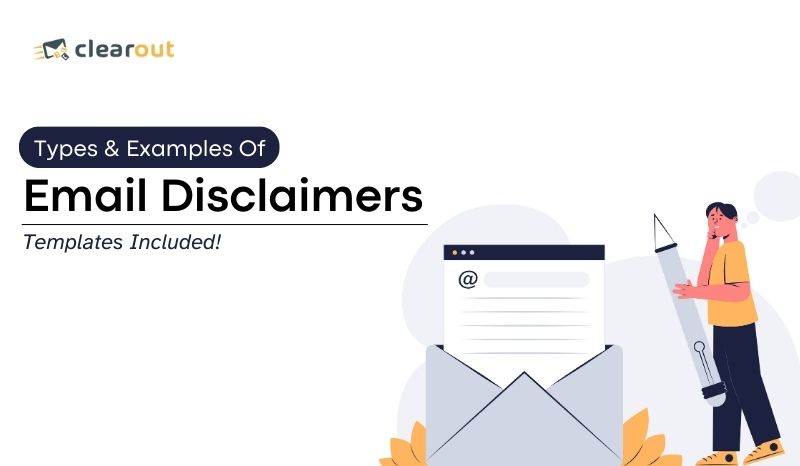

Did you know that a mere 62-word email disclaimer saved Zions First National Bank from a litigious claim for fraud? Yes, we’re talking about the same forgettable or overused lines at the end of an email that readers often gloss over!
Here’s how you can make email disclaimers work for you.
An email disclaimer is a short paragraph worded as a disclaimer, notice, or warning. Think of it as the fine print surrounding the nature or usage of the email contents. The email disclaimer sits at the footer and is distinct from the email body, the signature line, or other details.
While an email disclaimer may not always be legally enforceable or binding, at the very least, it serves as a cautionary tale. It can safeguard organizational interests and reputation in the case of:
In short, failing to include an email disclaimer template is a risk in itself!
Email disclaimers can be your layer of protection for legal repercussions. However, drafting an email disclaimer can be time-consuming and, honestly, not the best use of your sharp email writing skills. So, we’ve rounded up 11 common email disclaimer examples to save you both time and effort.
True to their name, limited liability email disclaimers attempt to minimize liability - for one thing or another. You could use them as employer liability, that is, to indicate that the views, beliefs, or opinions in the emails are that of the sender alone and are not a reflection of your organization.


Given their versatile nature, it comes as no surprise that they are, by far, the most common email disclaimer templates in use.
🔈Limited liability Email Disclaimer Template
Please note that the contents of this email and any attached documents are confidential and
intended solely for the intended recipient. They may contain sensitive and proprietary
information that is subject to legal protection. Unauthorized use, disclosure, or distribution of
this content is strictly prohibited. If you have received this message in error, kindly notify the
sender immediately. Please be advised that our liability is limited in accordance with applicable
laws.We appreciate your understanding and cooperation in maintaining the confidentiality of this
communication.
Despite being comprehensive in every way imaginable, the General Data Protection Regulation (GDPR) does not have any strict guidelines regarding the use of email disclaimers. That said, adding an email disclaimer can be an excellent trust-building opportunity for businesses serving the European Union and European Economic Area.
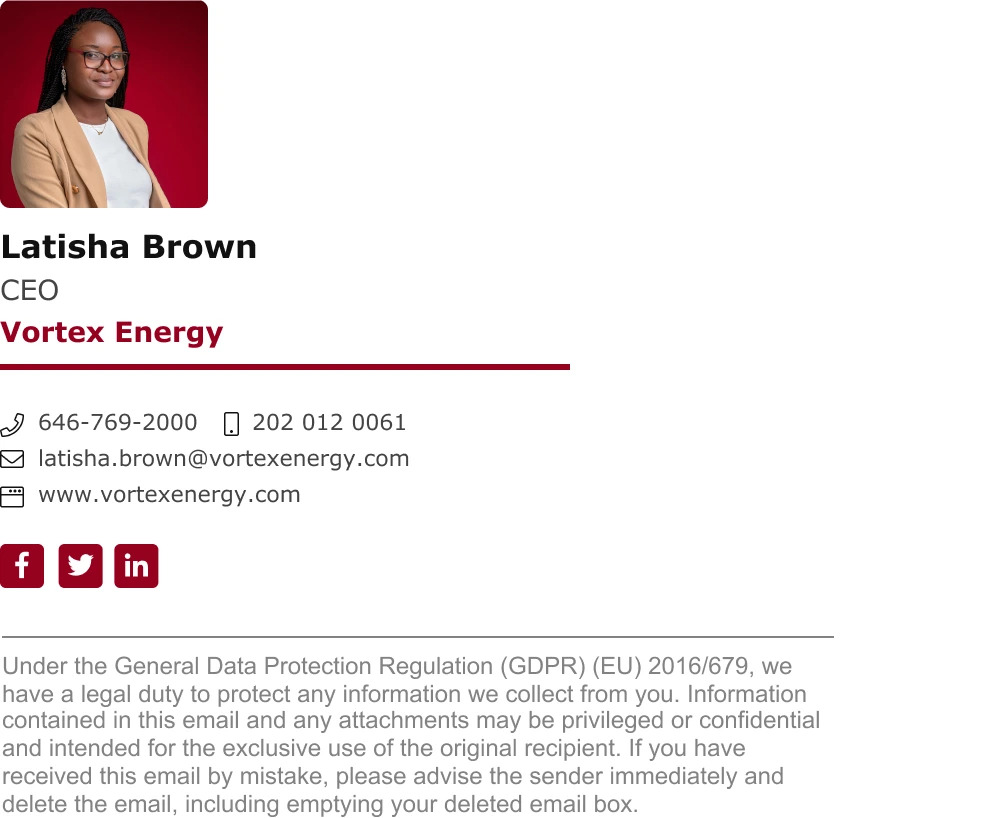
Such email disclaimer examples can indicate 100% compliance, disclose details surrounding personal data collection and usage, communicate security and privacy commitments, or simply offer the receiver the option to unsubscribe.
Incorporate your business name, registration number, place of registration, and registered office address, and you can be EU Directive 2003/58/EC compliant too!
You might also want to check out other local or regional regulations (like the CCPA) revolving around email disclaimers.
🔈GDPR Email Disclaimer Template
We at [Company Name] take great pride in adhering to 100% GDPR compliance. We are
committed to handling your data in strict accordance with EU data protection regulations. For
more information on our data management practices, please refer to our Privacy Policy. If you
no longer wish to receive our emails, please click on the Unsubscribe button below.
Email disclaimers under the Health Insurance Portability and Accountability Act (HIPAA) are far more strictly enforceable, with pecuniary fines ranging from $100 to $1.5 million! It makes sense, considering that patient data must be highly regulated and email is the go-to medium for communicating healthcare information.
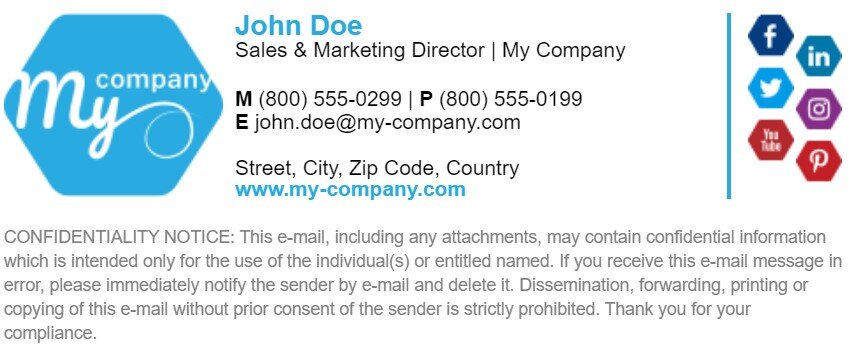
As such, businesses can add a HIPAA email disclaimer informing that no email is 100% secure, the information contained is confidential, the email is intended solely for the recipient named in the email, and there will be legal consequences for using or distributing someone else’s medical information without consent.
🔈HIPAA Email Disclaimer Template
This email contains confidential protected health information (PHI) and is intended solely for the
recipient whose name appears on this email. Kindly refrain from reading, using, or disclosing the
information contained in this email if you are not the intended recipient. Unauthorized access,
use, or dissemination of PHI is strictly prohibited and is punishable under HIPAA laws. If you
have received this email in error, please notify the sender immediately to rectify the situation.
Thank you.
If you are sending out newsletters as a part of your affiliate marketing efforts, then such emails must carry disclaimers indicating the same.
An affiliate disclaimer should inform the recipient that you will earn a commission on the successful purchase of products and services endorsed, promoted, recommended, or reviewed in the email. Such declarations are mandated by regulatory watchdogs like the Federal Trade Commission (FTC) in the US.
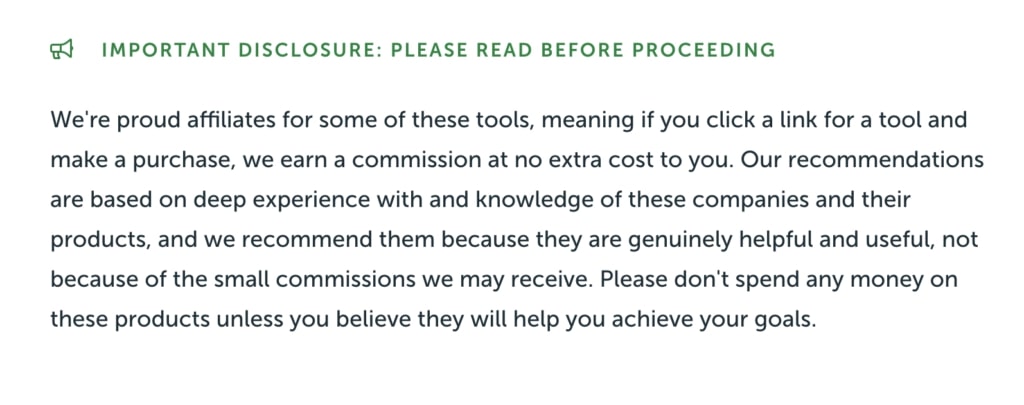
Even though one may argue that the FTC documentation does not explicitly cover email per se, the channel does count as “any communication using an interactive electronic medium.” So, it is better to be safe than sorry!
🔈Affiliate Marketing Email Disclaimer Template
This email may contain affiliate links, which means that if you click on one of the product or
service links, we may receive a commission. This commission helps us maintain and improve
the quality of our website and provide valuable content for our readers. Please note that we only
recommend products or services that we believe will add value to our audience.
Senders use such email disclaimer examples in case of communications containing sensitive and personally identifiable data, such as the person’s name, address, bank account details, taxpayer identification number, social security number, etc.
A confidential email disclaimer warns the receiver of legal consequences in case the email is accidentally sent to someone who is not the intended recipient of the email. At the same time, it advises them to immediately inform the company of the discrepancy and delete the said email.
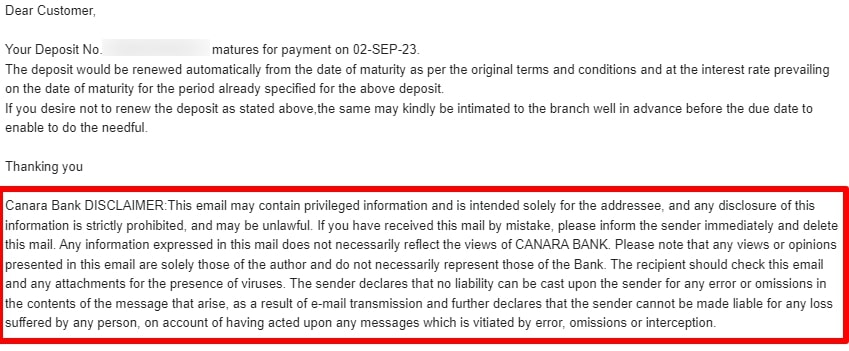
Given the sensitive nature of such an email disclaimer, it is a good practice to place it at the top of the email so that the receiver reads it first before going through the email content.
🔈Confidential Email Disclaimer Template
This email contains confidential information. If you have received it in error, please notify us
immediately and delete the message. It is strictly prohibited to copy, forward, or disclose the
contents of this message to anyone. Please note that the security and accuracy of this email
cannot be guaranteed. Therefore, the sender shall not be held accountable for any damages
caused by the message.
An email disclaimer for privileged information is often used in emails containing advice or opinions tendered by someone in a professional capacity. As such, you will often find them in emails from financial advisors, lawyers, medical professionals, life coaches, spiritual leaders, and so on.
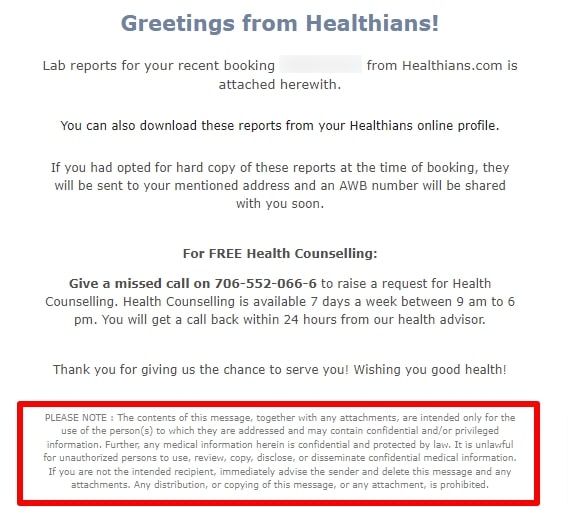
Such email disclaimer templates are slightly more strongly worded than confidentiality email disclaimers and discourage the dissemination, distribution, or copying of the material contained.
🔈Privileged Information Email Disclaimer Template
This email contains confidential and privileged information. It is intended only for the named
recipient(s) and may contain information that is legally privileged, confidential, and exempt from
disclosure. If you are not the intended recipient, please do not read, use, disseminate, or copy
this email or any attachments. Please notify the sender immediately by return email or phone
call. Thank you.
A negligent misstatement is the representation of a fact made carelessly, erroneously, or ambiguously, leading to the disadvantage of the recipient. It is often used to obviate “duty of care” related to emails requiring heavy interpretation and, in some cases, subsequent action.
Companies also use it as a shield to limit liability in case of negligent advice issued by an employee without due diligence and endorsement.
🔈Misstatement Email Disclaimer Template
Please note that our company cannot be held liable for the content of this email or any actions
taken based on the information provided. This is unless the information is confirmed in writing
at a later time. If you are not the intended recipient, please be aware that any disclosure,
copying, distribution, or action taken in reliance on the contents of this information is strictly
prohibited.
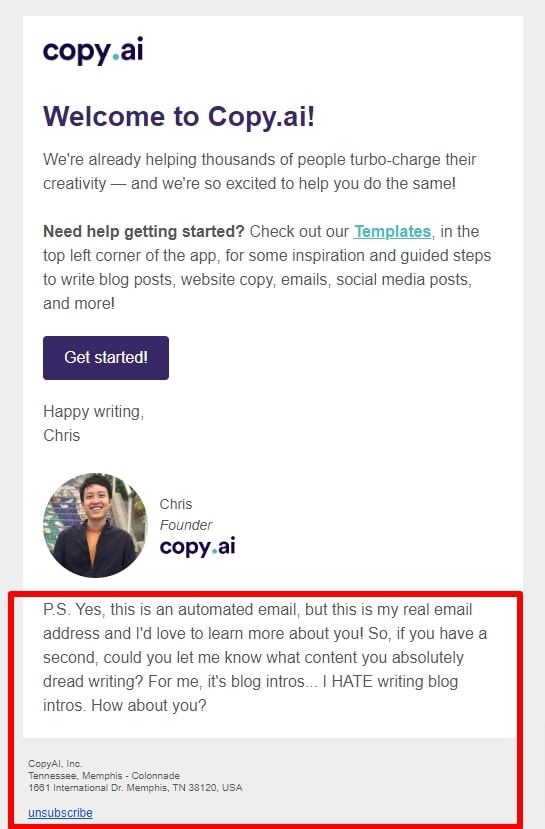
There are multiple reasons to include email disclaimers in automated marketing emails. For starters, it is a pleasant reminder to the recipient that they are on your mailing list. Such knowledge transfers control into the hands of the receiver as they decide whether they wish to hear from you or otherwise.
As such, these disclaimers must also contain an unsubscribe link in case the receiver wants to opt out. Such anti-spam email elements will not only make your emails more compliant but also enhance deliverability as your emails reach the target audience.
🔈Automated Marketing Email Disclaimer Template
This is an automated email. While we strive to provide accurate and up-to-date information,
please note that the content of this email may not be comprehensive or current. If you do
not wish to receive such emails you can unsubscribe using the given link. In case you have
any questions or concerns, please contact us directly at [Company Contact Information].
Thank you.

These email disclaimers are designed to protect the sender and, by extension, the organization from any kind of litigation. It communicates that anything discussed in the email is not legally binding and is not tantamount to a contract unless it is clearly specified and agreed upon by both parties.
Such disclaimers prove their worth in cases of emails discussing quotations or terms of employment. Case in point: the email disclaimer used by Zions, which won them the lawsuit!
🔈Non-Binding Email Disclaimer Template
Thank you for contacting us! Please note that this email does not create any legal obligations
or commitments. We appreciate your interest and will review your message.